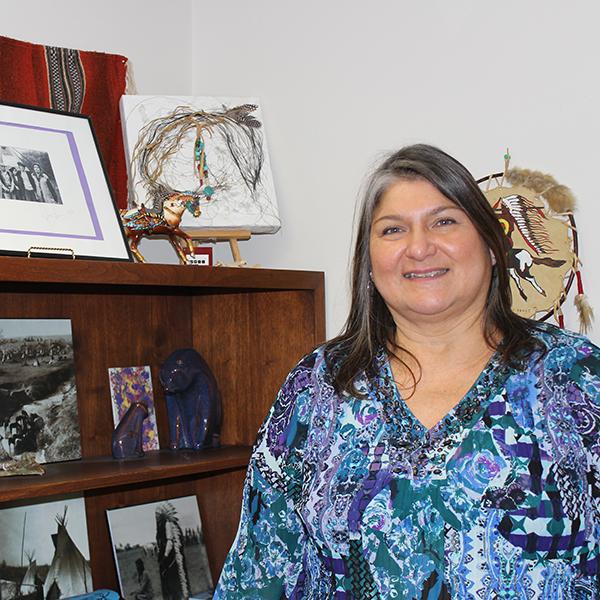
Alumni Spotlight

Alumni Spotlight
Completing a Ph.D. in Social Work was not a likely path for Bonnie Freeman ‘92. Growing up in Rochester, New York, education was not seen as an accessible path for most of the people in Freeman’s life. At the time, if a Native person pursued postsecondary education, they would lose their Indian status.
Discouraged from applying to colleges, once Freeman graduated from high school, she immediately transitioned from working part-time to full-time at a local grocery store. She worked her way up to a mid-level managerial position in which she supervised employees, including college students. “I always encouraged them to further their education,” says Freeman. “At the same time, I was envious because going to college was something I longed for.”
Freeman was overlooked for a number of well-deserved promotions at the store. The final straw was a college graduate without any experience being hired to fill the role of day manager. “It was a frustrating and disappointing experience,” says Freeman. “Today I look at it as the turning point for realizing my dream of going to university.”
From that point onward, Freeman went on to obtain an impressive number of degrees with renowned institutions—she holds a diploma in Native Community Care Counselling and Development from Mohawk, a Bachelor of Social Work from McMaster University and a Ph.D. in Social Work from Wilfrid Laurier University.
It was no easy feat for Freeman to enroll in post-secondary studies. In 1990, faced with the decision of receiving no educational funds for studying outside her region, or receiving educational funds by attending a local institution, Mohawk College, Freeman enrolled in the Native Community Care Counselling and Development program. Freeman quickly embraced the curriculum which led to a job working on Six Nations with Helping Our Moms Effectively (HOME), a program where she assisted mothers in the community to get the resources they needed for themselves and their children.
Meeting a professor from McMaster University’s School of Social Work—through her program at Mohawk—once again sparked her unwavering interest to obtain a degree in social work. In 1992, Freeman began her first year of the Bachelor of Social Work undergraduate program at McMaster. Midway through her studies, the competing priorities of working full-time in the Six Nations Social Services department, caring for her son, and attending school full-time proved to be overwhelming. After failing university courses, Freeman decided to take a break from her education.
The break did not last long—receiving an OSAP loan, Freeman soon afterward returned to her studies at McMaster. In 1995, Freeman was hired full-time as Indigenous Student Counsellor with the Indigenous Studies program. She temporarily put aside her education and focused on helping Indigenous students at McMaster. Encouraged to finish her studies part-time by a mentor at the university, Freeman completed her Bachelor of Social Work program in 2002, followed by completion of a Master of Social Work in 2005.
A desire to continually learn, research and think critically led to completing a Ph.D. in Social Work at Laurier. “The process [of getting my Ph.D.] was an interesting one,” says Freeman. “My dissertation research evolved into not only teaching my peers about Indigenous culture but enlightening my professors, too.”
In 2008, midway through her Ph.D. program, Freeman was faced with a serious health challenge—she was diagnosed with stage four cancer. Remarkably, Freeman remained positive and kept up with her studies, all while undergoing surgery and an intensive eight months of chemotherapy. Once the side effects of chemo wore off, Freeman worked hard to complete comprehensive exams and her dissertation.
During this time, a unique and exciting opportunity presented itself. McMaster’s School of Social Work offered the first Indigenous Pre-Doctoral Fellowship in Canada leading to a tenure-track position. After an extensive round of interviews, Freeman was the successful candidate for the new position.
Presently, as Assistant Professor in the School of Social Work at McMaster University, Freeman teaches and participates on university committees. She also actively conducts research that is rooted in her connections with Six Nations, the Hamilton Aboriginal Community and other Indigenous communities throughout Canada and the United States.
“There were many obstacles in my path to achieving higher education,” says Freeman. “Yet, a person has to be open to the opportunities that are presented, [and now] I realize that everything I learned in the Native Community Care Counselling Development Program, was really a foundation for not only meeting my educational, but also my career goals.”
Bonnie offers some advice to students, “If I could tell students one thing about the importance of higher education, it’s to never give up on your goal! There are many supports and resources for Indigenous students at colleges and universities—seek those people and programs out, they are there to help and support you.”
By: Meaghan Drury and Martha Li
This story was originally published in Spring 2018 in the Mohawk Alumni In Touch magazine.
When Témo Cruz enrolled in Mohawk College’s Architectural Technology Program, he never imagined it would introduce him to the world of shipping con
Mohawk alumnus Greg Gagnon has “it”. Expertise, character and passion that have led to two high esteemed awards.
After graduating from Mohawk College's Recreation and Leisure program, the world called, and Iuliana Raducanu answered.